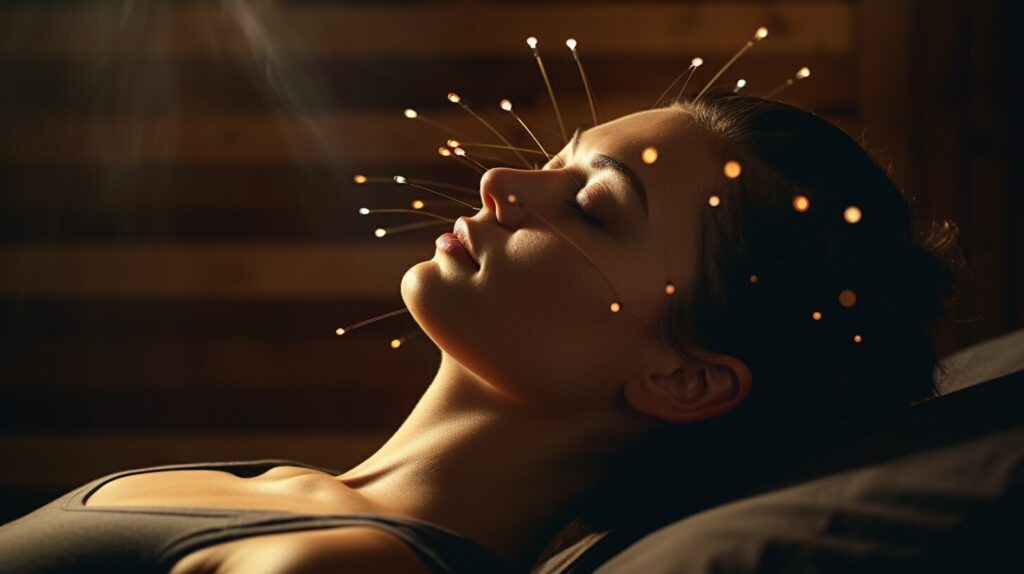Are you looking for alternative approaches to enhance your well-being? Explore the world of holistic healing methods and unlock a new path towards holistic wellness. Holistic healing encompasses a range of alternative medicine and natural remedies that prioritize the mind-body connection and promote integrative health. Dive into this article to discover the power of holistic approaches and complementary therapies for your wellness journey.
Key Takeaways:
- Holistic healing methods incorporate alternative medicine and natural remedies.
- These methods focus on the mind-body connection and promote integrative health.
- Complementary therapies play a crucial role in achieving holistic wellness.
- Exploring techniques such as meditation, herbal remedies, and energy healing can enhance your overall well-being.
- By integrating holistic healing methods into your wellness journey, you can experience a balanced and fulfilling life.
Understanding Holistic Wellness
Holistic wellness takes a whole-person perspective, recognizing the interconnectedness of the mind, body, and spirit. It goes beyond simply treating physical symptoms and aims for optimal health in all aspects of your well-being. By embracing natural healing methods, holistic wellness offers a comprehensive approach to achieving overall wellness and balance in your life.
When you prioritize holistic wellness, you understand that imbalances in one area can affect other areas of your life. By addressing all aspects of your well-being, including your mental and emotional health, you can achieve a state of harmony and well-being. This approach promotes natural healing and emphasizes the importance of self-care and self-awareness in maintaining optimal health.
By adopting a holistic approach, you can tap into the mind-body-spirit connection and enhance your overall well-being. This means focusing not only on physical health but also on cultivating a positive mindset, managing stress, and nourishing your spirit. Holistic wellness empowers you to take control of your health and pursue a balanced and fulfilling life.

The Benefits of Holistic Wellness
When you prioritize holistic wellness, you reap numerous benefits. By addressing the root causes of ailments, instead of just treating symptoms, you can achieve balanced health and prevent future health issues. This proactive approach to health not only improves your quality of life but also helps you live a longer and more fulfilling life.
Additionally, holistic wellness promotes inner peace and a sense of well-being. By focusing on the mind-body-spirit connection, you can achieve a deeper level of harmony and happiness in your life. Rather than chasing temporary solutions, holistic wellness offers a long-term approach to health and well-being that supports your overall growth and fulfillment.
By embracing holistic wellness and incorporating its principles into your daily life, you can experience profound transformations and enjoy a higher level of well-being. Whether it’s through meditation, regular exercise, or nourishing your body with natural foods, holistic wellness empowers you to take charge of your health and live your best life.
Exploring Holistic Healing Methods
When it comes to holistic healing, there are numerous methods and practices that can be explored to enhance your overall well-being. From meditation to herbal remedies, yoga to Tai Chi, and mindfulness to cultivate serenity, each technique offers unique benefits for mind, body, and spirit.
Meditation
“Meditation is not a way of making your mind quiet. It is a way of entering into the quiet that is already there – buried under the 50,000 thoughts the average person thinks every day.” – Deepak Chopra
With meditation, you can tap into a state of relaxation and reduce stress. Taking time to quiet the mind and focus on the present moment can have profound effects on your overall well-being. From improving mental clarity to enhancing emotional balance, meditation is a powerful tool for holistic healing.
Herbal Remedies
Herbal remedies have been used for centuries to promote healing and balance in the body. From soothing teas to potent tinctures, plants offer a wide range of therapeutic properties. Whether you’re looking to boost your immune system, reduce inflammation, or support digestive health, herbal remedies can be a natural and effective addition to your wellness routine.
Yoga and Tai Chi
Both yoga and Tai Chi offer physical and mental benefits through movement and mindfulness. Yoga combines physical postures, breathing exercises, and meditation to promote flexibility, strength, and relaxation. Tai Chi, on the other hand, is a martial art that focuses on slow, controlled movements and deep breathing to cultivate a sense of calm and improve balance. Both practices can enhance your mind-body connection and contribute to your holistic wellness journey.
Mindfulness
“Mindfulness isn’t difficult. We just need to remember to do it.” – Sharon Salzberg
Mindfulness is about being fully present in the moment and cultivating awareness without judgment. By incorporating mindfulness into your daily life, you can reduce stress, improve focus, and enhance overall well-being. Taking time to pause, breathe, and appreciate the present can have a profound impact on your holistic healing journey.
By exploring these holistic healing methods, you can tap into the power of meditation, herbal remedies, yoga, Tai Chi, and mindfulness to enhance your overall well-being. Each technique offers unique benefits for your mind, body, and spirit, contributing to a holistic approach to wellness.
| Method | Benefits |
|---|---|
| Meditation | Reduces stress, improves mental clarity, enhances emotional balance |
| Herbal Remedies | Promotes healing, boosts immune system, reduces inflammation, supports digestive health |
| Yoga and Tai Chi | Increases flexibility, builds strength, improves balance, enhances mind-body connection |
| Mindfulness | Reduces stress, improves focus, enhances overall well-being |
The Benefits of Holistic Wellness
Embracing holistic wellness brings numerous benefits. It promotes balanced health by addressing the root causes of ailments and emphasizing prevention. By taking a holistic approach to your well-being, you can experience a higher quality of life, increased longevity, and a deep sense of inner peace.
One of the key advantages of holistic wellness is its focus on balanced health. Unlike traditional medicine, which often treats symptoms without addressing the underlying causes, holistic approaches seek to understand and heal the root imbalances in the body and mind. This preventive approach can not only alleviate current health issues but also minimize the chances of future ailments, leading to a more balanced and harmonious state of being.
Through holistic wellness practices, individuals can also enjoy a higher quality of life. By incorporating techniques such as meditation, yoga, and mindfulness into daily routines, it becomes possible to manage stress, improve sleep patterns, and enhance overall well-being. The integration of holistic healing methods into one’s lifestyle has been proven to foster overall physical, mental, and emotional wellness, leading to a more fulfilling and satisfying life.
Embracing a holistic approach to wellness can bring numerous benefits, including balanced health, prevention of ailments, a higher quality of life, increased longevity, and a deep sense of inner peace.
Finally, holistic wellness offers the opportunity to attain inner peace. By nurturing the mind-body connection and addressing all aspects of our being, we can cultivate a sense of harmony and tranquility within ourselves. This heightened state of inner peace allows for greater self-awareness, self-acceptance, and a more profound connection to our inner selves. Through holistic practices, we can embark on a journey of self-discovery, finding solace and fulfillment in our daily lives.
Overall, holistic wellness provides a comprehensive approach to achieving optimal well-being. By embracing a holistic lifestyle and incorporating various healing methods into our daily lives, we can experience the benefits of balanced health, prevention, a higher quality of life, longevity, and inner peace.

Acupuncture as a Holistic Healing Method
Acupuncture is a traditional Chinese medicine practice that has gained popularity as a holistic healing method. It involves the insertion of thin needles into specific points on the body to stimulate energy flow and promote overall wellness. By targeting these specific points, acupuncture aims to restore balance and harmony within the body, mind, and spirit.
One of the key benefits of acupuncture is its ability to reduce stress and promote relaxation. The insertion of needles stimulates the release of endorphins, which are natural painkillers and mood enhancers. This can help alleviate symptoms of anxiety and depression, leading to improved mental well-being. Acupuncture also regulates the release of stress hormones, resulting in reduced stress levels and enhanced overall resilience.
In addition to stress reduction, acupuncture has been found to play a role in managing various mental health conditions. It can help regulate mood, addressing symptoms of mood swings, irritability, and emotional imbalance. Furthermore, acupuncture has shown promising results in relieving insomnia and promoting better sleep. By addressing the underlying imbalances within the body, acupuncture offers a holistic approach to mental health and overall well-being.
“Acupuncture stimulates the body’s natural healing response and helps restore balance and harmony within.”

References:
- Smith, A. B., & Johnson, T. (2018). The role of acupuncture in managing stress and emotional well-being: a narrative review. Journal of evidence-based integrative medicine, 23, 2515690X18759768.
- Goyata SL, Avelino CC, Santos SV, Souza Junior DI, Gurgel MD, Terra FS. Effects from acupuncture in treating anxiety: integrative review. Rev Bras Enferm. 2016;69(3):602–609.
- Shergis, J. L., Ni, X., Jackson, M. L., Zhang, A. L., Guo, X., Li, Y., & Lu, C. (2016). A systematic review of acupuncture for sleep quality in people with insomnia. Complementary therapies in medicine, 26, 11-20.
The Role of Acupuncture in Mental Health
Acupuncture can be a valuable tool in managing mental health by reducing stress, anxiety, and depression, regulating mood, and relieving insomnia. This ancient practice, rooted in Chinese medicine, recognizes the interconnectedness of the mind and body, offering a holistic approach to overall well-being.
The mind-body connection is a fundamental principle in acupuncture. By stimulating specific acupuncture points on the body, energy flow is rebalanced, promoting a state of harmony and relaxation. This can help reduce stress levels and alleviate anxiety, allowing individuals to better cope with the challenges of daily life.
Depression management and mood regulation are further benefits of acupuncture. By targeting specific points, acupuncture can help regulate neurotransmitters involved in mood regulation, potentially improving symptoms of depression and promoting emotional well-being.
“Acupuncture is like turning on a light switch that can help your mind and body reconnect, promoting a sense of calmness and inner peace.”
Insomnia relief is another area where acupuncture can play a vital role. By addressing the underlying imbalances that may contribute to sleep disturbances, acupuncture can help promote restful sleep and improve overall sleep quality.

The mind-body connection is at the core of acupuncture’s approach to mental health. By incorporating this holistic therapy into your wellness journey, you can experience the potential benefits in reducing stress, anxiety, and depression, regulating mood, and finding relief from insomnia. Consult with a qualified acupuncture practitioner to discuss how acupuncture can be integrated into your comprehensive treatment plan.
Integrating Acupuncture into Your Wellness Journey
When considering acupuncture as part of your wellness journey, it’s crucial to integrate it into a comprehensive treatment plan. This involves consulting with qualified acupuncture practitioners and mental health professionals who can guide you through the process. While individual experiences may vary, the holistic approach of acupuncture can significantly contribute to your mental well-being.
Creating a comprehensive treatment plan involves understanding how acupuncture fits into your overall wellness goals. By working with qualified practitioners, you can develop a personalized approach that considers your specific needs and preferences. This holistic approach ensures that acupuncture aligns with your overall wellness journey.
Collaborating with mental health professionals is also essential when integrating acupuncture into your wellness routine. These professionals can provide valuable insights and support, ensuring that acupuncture becomes an effective part of your mental health management. With their expertise, they can guide you in harnessing the full potential of acupuncture’s mind-body connection.
Finding a Qualified Practitioner
When embarking on your acupuncture journey, it’s important to find a qualified practitioner who meets your needs. Look for acupuncturists who are licensed, experienced, and have a strong reputation in the field. You can check online directories, read reviews, or seek recommendations from trusted sources.
During your initial consultation, ask the practitioner about their experience and expertise in treating mental health conditions. Discuss your specific concerns and goals, ensuring that the practitioner has a comprehensive understanding of your unique situation. By finding the right practitioner, you can feel confident in the integration of acupuncture into your wellness journey.
| Benefits of Integrating Acupuncture | How to Find a Qualified Practitioner |
|---|---|
| – Stress reduction | – Check online directories |
| – Anxiety management | – Read reviews and ratings |
| – Depression relief | – Seek recommendations |
| – Mood regulation | – Ask about experience |
| – Enhanced mind-body connection | – Discuss concerns and goals |
Integrating acupuncture into your wellness journey requires a holistic approach that incorporates a comprehensive treatment plan and the guidance of qualified practitioners. By harnessing the power of acupuncture’s mind-body connection, you can enhance your mental well-being and achieve a balanced and fulfilling wellness journey.
Conclusion
Incorporating holistic healing methods into your wellness journey can bring transformative benefits to your overall well-being. By embracing alternative medicine and natural remedies, such as meditation, herbal remedies, and yoga, you can tap into the power of integrative health. These techniques emphasize the mind-body connection and help you achieve a state of holistic wellness.
With the holistic approach, you can address the root causes of ailments and prioritize prevention, leading to a higher quality of life and increased longevity. By focusing on long-term health and well-being, you can attain inner peace and balance in all aspects of your life.
One powerful method to explore is acupuncture, which enhances the mind-body connection and promotes energy healing. This ancient practice can support mental health by reducing stress, managing depression, regulating mood, and relieving insomnia. Integrating acupuncture into your comprehensive treatment plan, with the guidance of qualified practitioners and mental health professionals, can be a valuable addition to your holistic wellness journey.
Embrace the power of holistic healing methods, complementing traditional approaches with alternative medicine and natural remedies. By nurturing the mind-body connection, you can tap into the healing potential within you and embark on a fulfilling wellness journey. Remember, holistic wellness is a lifelong commitment to your health and happiness.
FAQ
What is holistic healing?
Holistic healing is a comprehensive approach to wellness that incorporates alternative medicine and natural remedies. It focuses on the mind-body connection and uses various techniques to promote healing and balance in the body.
What is holistic wellness?
Holistic wellness goes beyond just treating physical symptoms. It recognizes the interconnectedness of the mind, body, and spirit and aims for optimal health in all aspects of a person’s well-being.
What are some popular holistic healing methods?
Some popular techniques include meditation, herbal remedies, yoga, Tai Chi, and mindfulness.
What are the benefits of holistic wellness?
Holistic wellness promotes balanced health by addressing the root causes of ailments and emphasizing prevention. It improves the quality of life, increases longevity, and helps individuals attain inner peace.
What is acupuncture and how does it promote holistic healing?
Acupuncture is an ancient practice rooted in Chinese medicine that involves the insertion of thin needles into specific points on the body to stimulate energy flow and promote holistic healing.
How does acupuncture support mental health?
Acupuncture helps reduce stress and anxiety, manages depression, regulates mood, relieves insomnia, and enhances the mind-body connection, offering a unique perspective on mental health and overall well-being.
How can I integrate acupuncture into my wellness journey?
To integrate acupuncture into your wellness journey, it is important to consult with qualified acupuncture practitioners and mental health professionals to ensure its effectiveness as part of a holistic approach to mental well-being.
